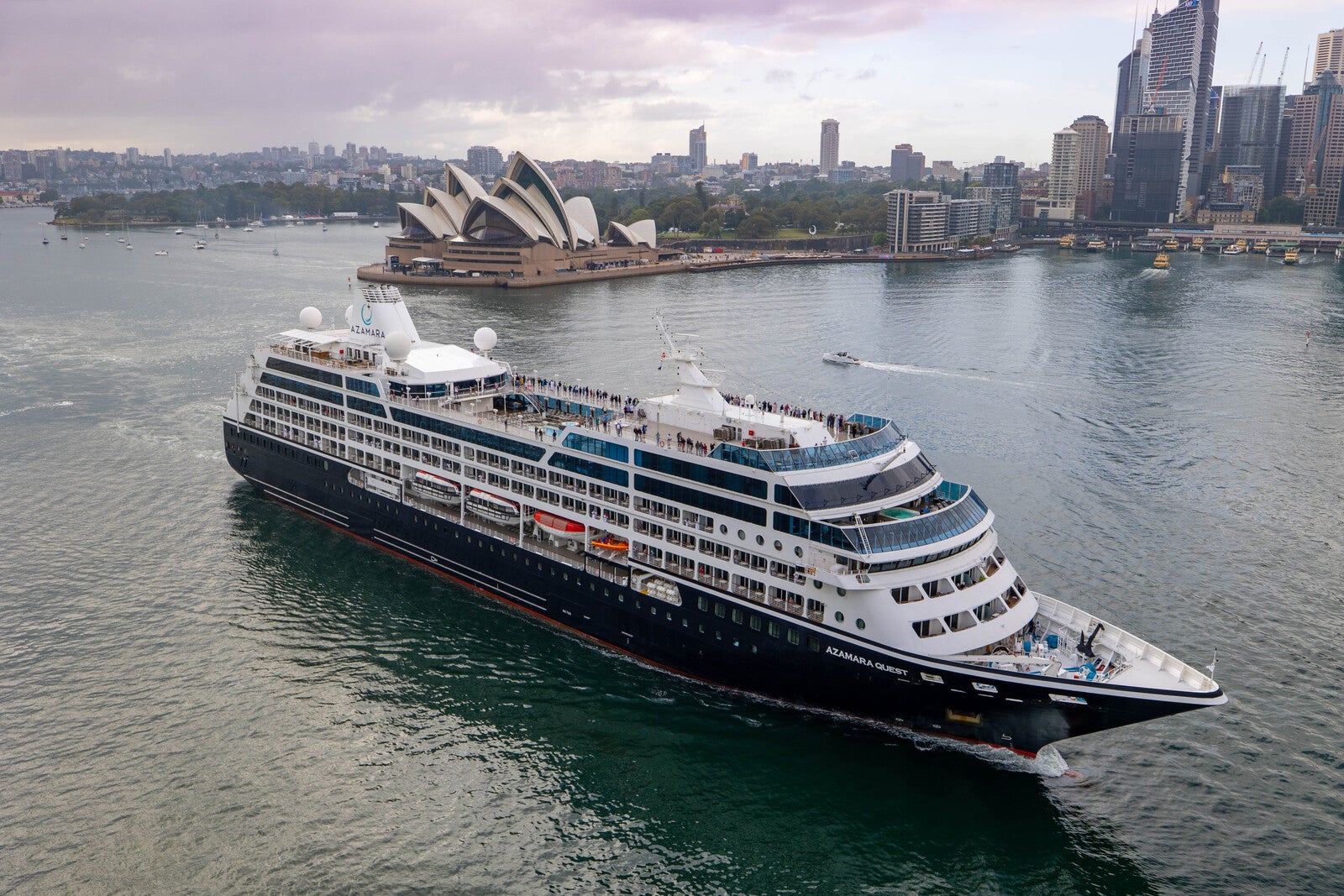The BBC is under fire over its decision to suspend broadcaster Gary Lineker from a long-running sports show.
Late last week, the former England soccer captain made headlines around the world when he tweeted criticism of the British government’s asylum policy.
The controversy has impacted the BBC’s sports programs, with dozens of sports presenters and reporters walking out of their jobs in support of Lineker.
Here’s a look at who Lineker is, the debate surrounding his comments and how it had affected the BBC.
Who is Gary Lineker?
Lineker, 62, is one of Britain’s most influential media figures and was paid 1.35 million pounds ($2.4 million) by the BBC last year.
One of England’s greatest football strikers — with 48 goals in 80 international appearances — he was a household name in Britain even before he became chief presenter of the soccer highlights show Match of the Day in 1999.
Match of the Day is one of the BBC’s longest-running shows, having first aired way back in August, 1964.
The Guinness World Records lists it as the world’s longest-running TV football program.
What exactly did he say?
Lineker quoted a tweet to his 8.7 million followers featuring UK Home Secretary Suella Braverman speaking out against boat arrivals in the UK on March 7.
“Good heavens, this is beyond awful,” he wrote.
Responding to replies to the tweet, Lineker described the government’s new plan to detain and deport migrants arriving by boat as “an immeasurably cruel policy directed at the most vulnerable people”.
He then went on to compare the language used by the government to that of 1930s Germany.
Did Braverman respond?
She sure did.
In an interview with ITV, Ms Braverman called Lineker’s 1930s Germany comparison “irresponsible”.
“Equating our measures — which are lawful, necessary and fundamentally compassionate — to 1930s Germany is irresponsible and I disagree with that characterisation,” she told ITV.
Ms Braverman added that Lineker’s future at the broadcaster was “a matter for the BBC and they will resolve that”.
How did the BBC respond?
The BBC said Lineker breached its social media guidelines and said he was to step back from presenting Match of the Day.
While BBC news staff are barred from expressing political opinions, Lineker is a freelancer who doesn’t work in news or current affairs.
However, in guidelines updated in 2020, the BBC said presenters with a “significant public profile” had responsibility to avoid taking sides on party political issues or political controversies.
On Saturday, BBC’s programming was severely disrupted as multiple presenters walked out, prompting the broadcaster to issue an apology.
“We are working hard to resolve the situation and hope to do so soon,” the BBC said in a statement.
“We are sorry for these changes which we recognise will be disappointing for BBC sport fans.”
What about the director-general of the BBC?
On Saturday night, the BBC’s director-general, Tim Davie, faced growing pressure to resign.
However, Mr Davie said he would not quit over the crisis.
“We, in the BBC, and myself, are absolutely driven by a passion for impartiality, not left, right or pandering to a particular party,” he said.
Meanwhile, the opposition Labour Party and media commentators have accused the BBC of silencing Lineker, bowing to pressure from the Conservative government.
“The BBC is not acting impartially by caving in to Tory MPs who are complaining about Gary Lineker,” Labour leader Keir Starmer said on Saturday.
However in a BBC interview, Mr Davie flatly rejected a suggestion that Lineker was suspended due to pressure from the governing Conservative Party.
What did Prime Minister Rishi Sunak say?
The whole saga prompted a response from Prime Minister Rishi Sunak himself.
Mr Sunak issued a statement on Saturday defending the policy, which bars the entry of asylum seekers arriving in small boats across the English Channel.
He said he hoped Lineker and the BBC could resolve their differences in a timely manner.
“It is rightly a matter for them, not the government,” Mr Sunak said.
Mr Sunak said it was important to maintain perspective, given the seriousness of the migration issue which saw 45,000 people risk their lives crossing the English Channel illegally last year.
Mr Sunak’s press secretary also responded, telling UK media the remarks were “unacceptable”.
“It’s obviously disappointing to see someone whose salary is funded by hard-working British [licence fee] payers using that kind of rhetoric and seemingly dismissing their legitimate concerns that they have about small boats crossings and illegal migration.
“But, beyond that, it’s up to the BBC, who I think have said today that they’ll be having a conversation with Gary Lineker, and it’s not for me to comment further.”
How has the BBC been affected?
The 100-year-old BBC is under scrutiny, particularly because it is a public corporation and is expected to be independent.
More immediately, the decision to suspend Lineker has triggered a mass walkout of BBC sports presenters and reporters in solidarity with their colleague.
Saturday’s edition of Match of the Day — which Lineker has presented for more than 20 years — aired at the usual time, despite his absence, but was slashed to just 20 minutes and was a show of highlights without commentary.
Sunday’s coverage of the Women’s Super League aired without commentary from regular BBC presenters and Match Of The Day 2 was also expected to run in a reduced format.
Mr Davie apologised for the disruption and said bosses were “working very hard to resolve the situation and make sure that we get output back on air”.
Why is there outrage?
Many who support Lineker have defended his right to express his opinion online.
“I cannot see why you would ask someone to step back for saying that,” said Liverpool manager Jurgen Klopp.
“If I understand it right, it is a message, an opinion about human rights and that should be possible to say.”
Others say the BBC’s impartiality rules seem muddled, pointing out that Lineker did not face discipline when he criticised the Qatar government’s rights record during the World Cup last year.
“It seems that they want to pick and choose when they want to be partial, criticising others or criticising other countries or other political parties or other religions seems to be OK,” former England soccer player John Barnes told Sky News.
Who else has come out in support?
A number of high-profile UK broadcasters of different political persuasions have spoken in support of Lineker, including Piers Morgan and Jeremy Clarkson.
“Gary Lineker off air is an assault on free speech in the face of political pressure,” the opposition Labour Party said, calling for the BBC to rethink its decision.
Scotland’s First Minister, Nicola Sturgeon, said the move was “indefensible”, while former Labour MP for Battersea, Lord Alf Dubs, tweeted his support for Lineker.
“I applaud Gary Lineker for his compassion and support for vulnerable people, particularly refugees. Thank you, Gary.”
Former Manchester United and England defender Gary Neville — a commentator for Sky Sports — said the decision was what happened when “you take on the Tories and the system”.
The impartiality furore has also brought renewed pressure on the BBC’s chair, Richard Sharp.
An MPs’ committee in February said Mr Sharp made “significant errors of judgement” in helping to facilitate a loan of 800,000 British pounds ($1.46million) for then-prime minister Boris Johnson.
Mr Sharp — a former banker and donor to the Conservative Party — told MPs he “didn’t arrange the loan” but acted in good faith as a “sort of introduction agency”.
The Labour Party has said Mr Sharp’s position is increasingly untenable.
AP/Reuters




















Discussion about this post